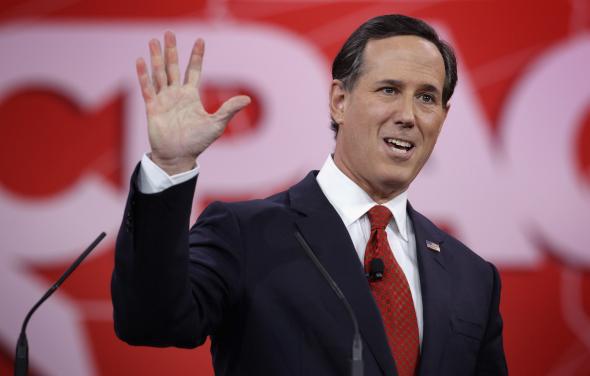Rick Santorum and Mike Huckabee have plenty in common. Both are self-appointed family-values warriors and former Fox News contributors. Both are past winners of the Iowa Republican caucuses. And, as of Wednesday afternoon, both are officially running for the GOP nomination for a second time—a task that will pit them against each other for the support of the same evangelical base that transformed them from likely also-rans to national runners-up during their previous cash-strapped White House runs.
But for all their similarities on paper, the 2008 caucus winner and the 2012 victor won’t be mistaken for each other on the campaign trail. As the Des Moines Register’s Kathie Obradovich has pointed out, the two candidates are already deploying starkly different strategies on the stump. Speaking at the Family Leadership Summit in Cedar Falls, Iowa, last week, Huckabee was all fire and brimstone, warning the predominantly Christian audience that their way of life was under attack from Washington. (“I didn’t come tonight to give you a speech. I came to sound the alarm.”) Santorum, meanwhile, continued his quest to transform himself into a champion of the working class, while also suggesting there was room for compromise in the nation’s capital. (“Ladies and gentlemen, aren’t you tired, just tired, of the bickering? Wouldn’t you like to see this country be able to work together again?”)
The easiest way to interpret those competing strategies is that Huckabee is going all in on cementing his status as the evangelical favorite, while Santorum is ceding a little ground in that battle in hopes of broadening his appeal elsewhere. In many ways, those choices make sense for both men. In 2012, Iowa’s social conservatives seemingly settled for Santorum, who eked out his caucus victory by 34 votes. In 2008, though, Hawkeye State evangelicals had no such reservations, and their love of Huckabee handed the former Arkansas governor the caucus crown with more than 10,000 votes to spare. Neither candidate is a fresh face this time around, but if evangelical voters are left to choose between the two in 2016, the smart money would be on Huckabee. Santorum can’t beat Huckabee at his own game, so he has to play a different one.
The candidates’ respective personalities, meanwhile, require the different strategies. Huckabee can get as mad as he wants on the stump without sounding particularly angry. He normally bookends his doomsaying by working the room better than pretty much anyone else in the race. His message may be all apocalypse and alarm bells, but his Pizza Ranch small talk is all smiles and rainbows (or at least grandkids and turkey hunting)—and, as a result, Huckabee’s most controversial comments are sometimes overlooked.
The same can’t be said for Santorum. Type Santorum into you Google search bar, for example, and you’ll see why the former Pennsylvania senator could be more eager to focus on economics and foreign policy than on more fraught territory like marriage equality and abortion. Santorum’s team tried to make the former key pillars of his 2012 campaign, but that effort was often overshadowed when the candidate went off-message to talk about the latter.
Santorum is never going to hide his social views, but his annoyance is difficult to miss when that’s all he is asked about. His camp has also made it clear they’d like to soften the frame around his views this time around. As his campaign strategist, John Brabender, told CNN recently: “He needs to show that we don’t always need to agree with one another, but that doesn’t mean we can’t show compassion and understanding for one another.”
So which message will win out? The Iowa caucuses (February 2016) and the GOP convention (July 2016) are an eternity from now, but the early polling suggests Santorum has much more work to do of the two. The latest RealClearPolitics national averages have Huckabee in fourth nationally and third in Iowa, while Santorum is 11th and 10th, respectively. In the end, though, it might not matter who wins the head-to-head matchup. With Ted Cruz, Scott Walker, and a host of other social conservatives around to siphon off evangelical votes (or flat-out overtake the defending champs), Iowa won’t be a two-man race. If Santorum and Huckabee both stick around, it will mark the first time that two former GOP caucus winners will face off in the state with a second victory on the line. But if that happens, it will only make it more unlikely that either will be able to repeat.
